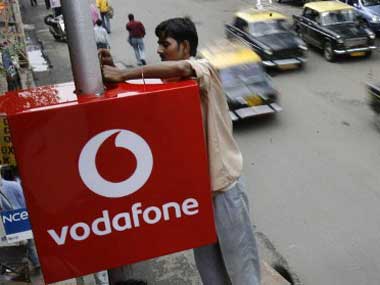By R Jagannathan
The finance ministry may have got an earful from international businessmen and political leaders for trying to retrospectively tax the Vodafone deal of 2007, but a closer look shows that the British telecom multinational is probably being too clever by half.
The logic of not taxing Vodafone is that the entire deal to buy Hutchison Essar’s Indian telecom operations happened offshore, and hence should be outside the clutches of the Indian taxman. (Incidentally, the capital gains taxes have to be paid by Hutchison, which made the gain, but Vodafone is being nicked for not deducting the tax at source, which is the Indian law).
However, Vodafone, by invoking the Indo-Netherlands Bilateral Investment Treaty (BIT), is now doing the opposite: claiming protection for an offshore deal which it says India should have nothing to do with.
As S Muralidharan points out in an article in BusinessLine, Vodafone is seeking protection under BIT because Vodafone Holdings, which holds no shares directly in Vodafone India, is a Dutch company. The shares are held in a Cayman Islands subsidiary.
[caption id=“attachment_285434” align=“alignleft” width=“380” caption=“Vodafone says that the government’s move for retrospective taxation is oppressive and an attempt at “expropriation”.AFP”]  [/caption]
“It does not lie in Vodafone’s mouth to say that the Cayman Islands company is actually the conduit of the Dutch company and take advantage of the Indo-Dutch agreement, having earlier pooh-poohed the same argument made by the Indian tax authorities - that the Cayman Islands company was a conduit through which foreign investment was channelised into India.”
Vodafone says that the government’s move for retrospective taxation is oppressive and an attempt at “expropriation”. The finance ministry claims that it has made no retrospective changes in the law, only retrospective clarifications of the intent of the law.
Here is what the law actually says about taxing income accruing in India.
“The following incomes shall be deemed to accrue or arise in India :-
(i) All income accruing or arising, whether directly or indirectly, through or from any business connection in India, or through or from any property in India, or through or from any asset or source of income in India, or through the transfer of a capital asset situated in India.”
A commonsense reading shows that at least half our readers would conclude this clause to mean that any income from an asset owned in India can be taxed if it generates income to anyone outside India.
The Bombay High Court found this clause valid enough to force Vodafone to pay tax, but the Supreme Court did not.
A larger point arises from the Vodafone effort to raise cain over the “retrospective” tax and that is this: Bilateral Investment Treaties (BITs) seem to have become levers in the hands of multinationals to take sovereign issues out of the power of third world governments.
As Vidya Ram argues in this well-researched piece, BITs have become ways of getting better deals for multinationals compared to even domestic companies, though the original purpose was to prevent nationalisation without adequate compensation.
BITs have been used by Philip Morris (maker of Marlboro cigarettes) to drag countries to arbitration courts for trying to curb cigarette advertising; by foreign mining companies to challenge anti-apartheid laws in South Africa to enable black empowerment; or by investors in Greek bonds (now junk) to seek more compensation for value loss.
While BITs can and are used by investors to sue developed countries, however, it is the poorer ones that are facing the brunt now. The experts clearly see many inequities embedded in BITs. “What it (a BIT) does is allow MNCs to sue the host country they invest in but doesn’t create any obligations the other way round,” says BusinessLine quoting Isolda Agazzi, a BIT specialist at Switzerland-based Alliance Sud.
In India, apart from Vodafone, BITs have been invoked by some of the telecom players who lost their licences in the 2 February 2G judgment (Telenor, Sistema), and another one is being threatened by The Children’s Investment Fund (TCI) to force Coal India’s board to raise prices.
Whatever the justification, one thing is clear: BITs will now increasingly be seen with suspicion in India.
In the Vodafone case, though, it would appear that the company does protest too much.


)
)
)
)
)
)
)
)
)



